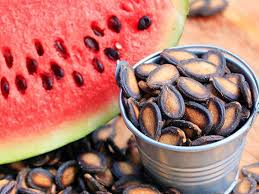
Watermelon is one fruit that’s hard to resist when it gets too hot. It’s sweet and is high in water content, making it the ideal summer fruit. But don’t throw away its seeds. Watermelon seeds come with many health benefits.
Know the benefits of watermelon seeds
When we think of watermelon, it’s just the pink portion of the summer fruit that comes to our mind. In fact, when we cut it open, we immediately keep the seeds aside to dump them in a dustbin. It’s a habit that you should give up because watermelon seeds have several health benefits. Like the sunflower seeds and chia seeds, watermelon seeds can also be consumed for good health. Let’s find out how watermelon seeds can help to be healthy.
Watermelon seeds may be often overlooked, but you would be surprised to know that they are a rich source of nutrients. Here are five potential health benefits of watermelon seeds.
Here are some products that you can try:
· Heart health
Watermelon seeds are an excellent source of magnesium. It plays an important role in maintaining a healthy heart by regulating blood pressure and supporting proper heart rhythm, says Bisht.
· Support for the immune system
Zinc is crucial for a strong immune system, so you will be happy to know that it is found in abundance in watermelon seeds. Immune cells that help to fight against infections and any disorder are produced and activated with the help of zinc.
· Digestive health
Watermelon seeds contain fiber and unsaturated fats, which can help support digestive health and promote healthy bowel movements.
· Healthy skin and hair
Thinking of using watermelon face masks? It’s not just application that’s helpful. Watermelon seeds are rich in protein and essential fatty acids, which can help to have healthy skin and hair, says the expert. These nutrients can also help to reduce inflammation and prevent acne.
· Bone health
We know that to have strong and healthy bones, we need calcium, and watermelon seeds contain the mineral. Apart from bone health, it is also needed for muscle function and proper nerve signaling.
How to eat watermelon seeds
You might be thinking should you eat them raw or add them to a dish. Well, you can cook watermelon seeds in the oven to make them edible. Salt or other seasonings can be added to the watermelon seeds after baking to enhance flavour, suggests the expert.
Another method to eat watermelon seeds is to powder them and sprinkle it on healthy salads or other nutritious foods.
Watch how much watermelon seeds you eat
Bisht says you can eat watermelon seeds regularly because they are a great source of vitamins, fiber, healthful fats and protein. But don’t have them in huge amounts as they are also high in calories. It is crucial to make sure that they are eaten in moderation. So stick to about 30 grams or about one-third of a cup of watermelon seeds for daily consumption. Watermelon seeds that have been roasted or sprouted are healthier because they are simpler to digest and contain more nutrients.
In general, watermelon seeds are safe to eat and have a number of health advantages. However, watermelon seeds should either be avoided altogether or used sparingly by some people.
* They have high fibre content, so watermelon seeds may be best avoided by those who suffer from stomach problems like irritable bowel syndrome.
* Watermelon seeds also have the potential to trigger allergic reactions in people with seed allergies or intolerances.
* They also contain high amounts of potassium, which can be harmful to people with kidney disease. So, those who have kidney issues or those who are receiving kidney dialysis may need to limit their intake of watermelon seeds.
Majority of people find watermelon seeds to be a nutritious snack, but if you have any health issue or pre-existing conditions, you should talk to your doctor before eating them.














